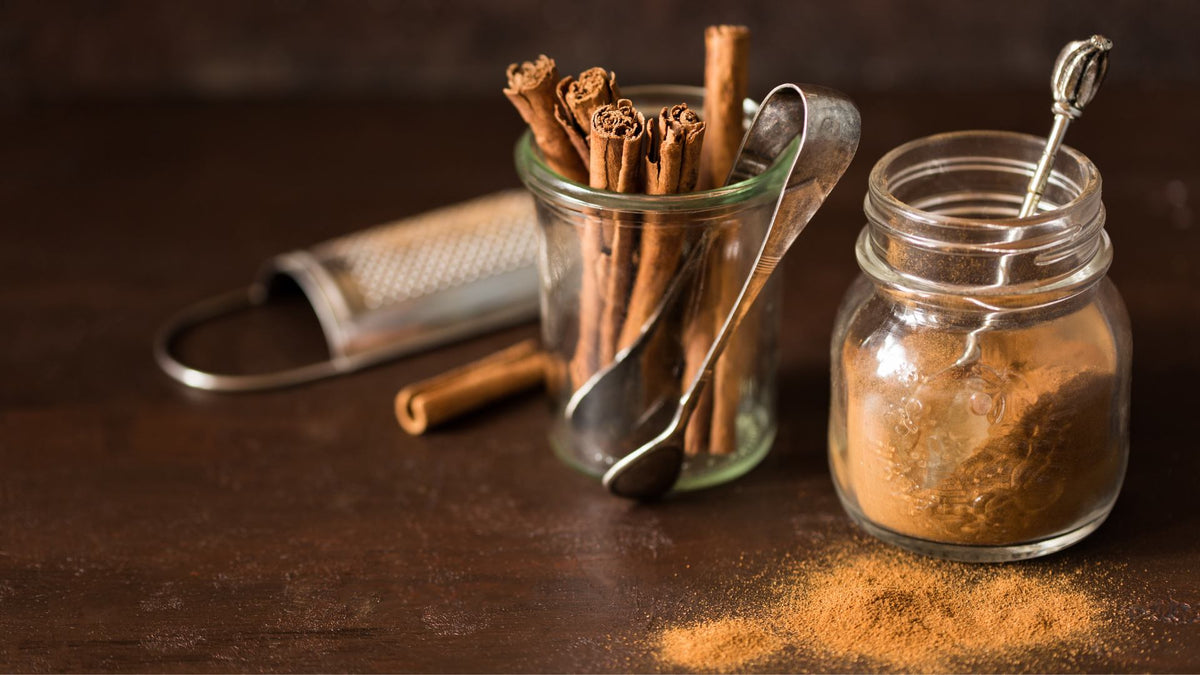
Does Ceylon Cinnamon Lower Blood Sugar?
|
|
Time to read 4 min
This store requires javascript to be enabled for some features to work correctly.
|
|
Time to read 4 min
Disclaimer: The information provided in this article is for educational purposes only and is not intended as a substitute for professional medical advice, diagnosis, or treatment.
In my last health blog, I summarised the seven main health benefits of Ceylon cinnamon. In this article, I will delve a bit deeper and discuss whether Ceylon cinnamon lowers blood sugar.
I will share various studies (references and further reading), briefly explain the mechanism behind its effects, and include some expert quotes.
Yes, Ceylon cinnamon does help to lower blood sugar levels. It works by slowing down the rate at which sugar is released into the blood and improving how well insulin works in your body - this helps manage blood sugar levels more effectively. I will explain the exact mechanisms of how Ceylon cinnamon achieves this in the next section, detailing the specific actions and compounds involved that contribute to these beneficial effects. This makes Ceylon cinnamon a useful natural option for those looking to manage their blood sugar, and for those individuals looking to manage diabetes.
However, before starting any new supplements, it's important to consult with a healthcare provider. Ceylon cinnamon should not substitute professional medical advice and treatment.
Enzyme Inhibition: Ceylon cinnamon contains compounds that slow down the breakdown of carbohydrates into sugar. This happens because it inhibits enzymes such as pancreatic α-amylase and α-glucosidase. As a result, sugar enters the bloodstream more slowly, preventing sharp spikes in blood sugar levels.
Glucose Uptake: It helps move the glucose transporter GLUT-4 to the cell surfaces. When GLUT-4 is on the cell surface, it can take more glucose from the blood into the cells, effectively lowering blood sugar levels.
Insulin Sensitivity: Cinnamon enhances the release of insulin from the pancreas and makes the body's cells better at responding to insulin. With improved insulin sensitivity, cells can use glucose more efficiently, reducing blood sugar levels.
Glycogen Synthesis: The spice supports the conversion of glucose into glycogen, which is stored in the liver and muscles. This not only helps in managing blood sugar levels immediately but also helps in controlling them over time.
Active Compounds: Cinnamtannin B1 is a compound found in Ceylon cinnamon that is pivotal for the health benefits related to blood sugar. It plays a key role in all the mechanisms mentioned— from enhancing insulin sensitivity to managing the breakdown and uptake of glucose.
Ceylon cinnamon: a versatile ingredient for futuristic diabetes management
Blood Sugar and Diabetes : Ceylon cinnamon has demonstrated significant potential in managing blood sugar levels and diabetes. It enhances insulin sensitivity, which helps in reducing the risk of type 2 diabetes by influencing the body's ability to use insulin effectively. This makes it a valuable dietary addition for futuristic diabetes management strategies.
Authors: Bhashika Sithijanee Senevirathne, Madhura Arunoda Jayasinghe, Dayani Pavalakumar, Chamath Gayan Siriwardhana
Institution: University of Sri Jayewardenepura and University of Vocational Technology, Sri Lanka
Publication: 2022 Journal of Future Foods
Health benefits of Ceylon cinnamon (Cinnamomum zeylanicum): a summary of the current evidence
Summary: This review focuses on the various health benefits of Ceylon cinnamon, particularly its impact on managing blood sugar and diabetes. The study identifies Ceylon cinnamon as effective in enhancing insulin sensitivity and controlling blood glucose levels, which are critical for diabetes management. These benefits are attributed to its ability to inhibit enzymes that interfere with insulin function and improve glucose uptake by cells.
Authors: Priyanga Ranasinghe and Priyadarshani Galappaththy
Institution: University of Colombo, Sri Lanka
Published: March 2016 in the Ceylon Medical Journal
Cinnamon Update of Potential Health Benefits
Blood Sugar and Diabetes: The study discusses the various clinical trials over the past decade that have evaluated cinnamon's efficacy in improving hyperglycemia, insulin sensitivity, and lipid profiles. It notes that while some studies indicate beneficial effects of cinnamon in reducing fasting blood glucose (FBG) and enhancing insulin sensitivity, the results are not consistent across studies. This inconsistency is attributed to variations in cinnamon form, dosage, and treatment duration, as well as differences in participant characteristics. The dosages explored in these studies varied widely, typically ranging from less than 1 gram to 6 grams per day, administered in forms such as powders and extracts.
Author: Keith Singletary, PhD
Institution: Department of Food Science and Human Nutrition at the University of Illinois, Urbana-Champaign
Publication: 2019 Journal: Nutrition Today
While dosage can vary by study, a common recommendation is between 1 to 6 grams of cinnamon powder per day. However, it's important to consult with a healthcare provider before starting any new supplement regimen.
Most research on cinnamon’s impact on blood sugar levels focuses on type 2 diabetes. There is limited evidence regarding its effectiveness for type 1 diabetes, as type 1 involves autoimmune insulin deficiency, which might not respond to cinnamon supplementation in the same way.
Ceylon cinnamon is thought to help lower blood sugar by improving insulin sensitivity, which means it helps the hormone insulin do its job better in transporting sugar from the bloodstream into cells.
Cinnamaldehyde: This is the primary active component in cinnamon and is believed to influence insulin signaling and sensitivity, helping to reduce blood glucose levels.
Polyphenolic Polymers: These compounds can mimic insulin, improving glucose uptake by cells and potentially reducing blood sugar levels.
Eugenol: Another compound found in Ceylon cinnamon, eugenol has been shown to have antioxidant properties, which can help improve insulin sensitivity and overall metabolic health.
Methylhydroxychalcone Polymer (MHCP): MHCP is specifically noted for its insulin-mimetic properties, enhancing the activity of insulin and thus improving glucose regulation.